

Cela ne prendrait qu'une centaine de jours aux zombies pour anéantir l'humanité. Zombies—A Pop Culture Resource for Public Health Awareness - Volume 19, Number 5—May 2013. Author affiliations: Author affiliation: University of California, Irvine, California, USA Suggested citation for this article Abstract Sitting at his laboratory bench, a scientist adds mutation after mutation to a strand of rabies virus RNA, unaware that in a few short days, an outbreak of this very mutation would destroy society as we know it.
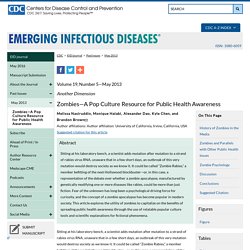
It could be called “Zombie Rabies,” a moniker befitting of the next Hollywood blockbuster—or, in this case, a representation of the debate over whether a zombie apocalypse, manufactured by genetically modifying one or more diseases like rabies, could be more than just fiction. Fear of the unknown has long been a psychological driving force for curiosity, and the concept of a zombie apocalypse has become popular in modern society. Although zombies are currently an integral part of our popular culture, our morbid fascination with the walking dead spans several centuries. History of Zombies in the Media Acknowledgment References Figure Figure. . . Zombie Preparedness. Zombie Blog There are all kinds of emergencies out there that we can prepare for.

Take a zombie apocalypse for example. Educators Website Looking to teach preparedness in the classroom? We’ve got full lesson plans and activities for you to use or adapt with your students. Preparedness 101 - Zombie Posters( It can be tough to get people thinking about emergency preparedness before disaster strikes. Novella( Looking for an entertaining way to introduce emergency preparedness? Social Media/Online Check out our Zombie Social Media page where you can find badges and widgets for your own site, links to our blog, content syndication, and zombie e-cards.
Zombie infections: epidemiology, treatment, and prevention. Tara C Smith, associate professor1Author affiliationstsmit176@kent.edu Tara C Smith summarises the epidemiology and pathology of zombie infections and calls for research and funding to prevent a zombie apocalypse Zombies—also known as walkers, Zed, Zs, biters, geeks, stiffs, roamers, Zeke, ghouls, rotters, Zoms, and runners—have become a dominant part of the medical landscape.

Zombie expert Matt Mogk defines a zombie with three criteria: it is a reanimated human corpse; it is relentlessly aggressive; and it is biologically infected and infectious.1 But Mogk notes that this definition has been altered by the recognition of “rage” zombies, which are infected but still alive. They are more closely related to vampires infected with the contagious bacterium Bacillus vampiris.2 Here, I review zombie biology and epidemiology.
History Although reanimated zombies have been documented for potentially millennia,8 rage zombies seem to be a more recent phenomenon. Le parasite d'une seule fourmi influence toute la colonie. PARASITE.

Lorsqu'une fourmi de l'espèce Temnothorax nylanderi est infectée par un cestode Anomotaenia brevis, elle prend une coloration jaunâtre à la place de son brun habituel. Son comportement est également modifié afin d'assurer la survie et la transmission du parasite à son hôte final. Syndrome lié à la culture. Un article de Wikipédia, l'encyclopédie libre.
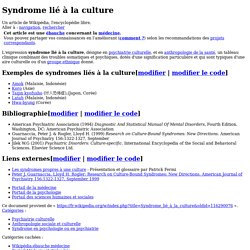
L'expression syndrome lié à la culture, désigne en psychiatrie culturelle, et en anthropologie de la santé, un tableau clinique combinant des troubles somatiques et psychiques, dotés d'une signification particulière et qui sont typiques d'une aire culturelle ou d'un groupe ethnique donné. Exemples de syndromes liés à la culture[modifier | modifier le code] Bibliographie[modifier | modifier le code] Culture-bound syndrome. Identification[edit] A culture-specific syndrome is characterized by:[citation needed] categorization as a disease in the culture (i.e., not a voluntary behaviour or false claim);widespread familiarity in the culture;complete lack of familiarity or misunderstanding of the condition to people in other cultures;no objectively demonstrable biochemical or tissue abnormalities (signs);the condition is usually recognized and treated by the folk medicine of the culture.
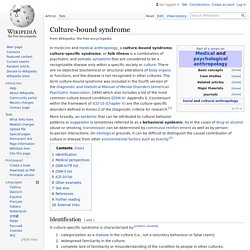
Some culture-specific syndromes involve somatic symptoms (pain or disturbed function of a body part), while others are purely behavioral. Some culture-bound syndromes appear with similar features in several cultures, but with locally specific traits, such as penis panics. QJM: An International Journal of Medicine. Sometimes an author manages to capture the essence of an article with such an arresting name that you feel compelled to read it.
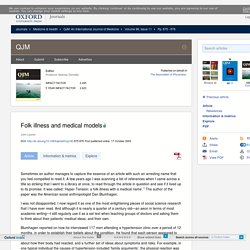
A few years ago I was scanning a list of references when I came across a title so striking that I went to a library at once, to read through the article in question and see if it lived up to its promise. It was called: ‘Hyper-Tension: a folk illness with a medical name’.1 The author of the paper was the American social anthropologist Dan Blumhagen. I was not disappointed. I now regard it as one of the most enlightening pieces of social science research that I have ever read. Syndromes propres à une culture. La notion de syndrome propre à une culture donnée, culture-bound syndrome en anglais, est définie dans le DSM IV comme « la survenue répétée de schémas de comportements aberrants et d’expériences perturbantes spécifiques d’une région et pouvant être liée ou non à une catégorie diagnostique.».

Cette définition apparemment claire n’est pourtant pas sans poser de nombreux problèmes théoriques et pratiques. Par exemple, certains « entités » répertoriées comme syndromes propres à une culture (SPC) n’appartiennent pas au champ de la maladie, ni même du désordre, aux yeux des autochtones et inversement. 10 histoires de zombies, le parasite parasité et une mine d'or pour le tibet. Plus populaires que jamais dans les films et les séries, les zombies ont également envahi le terrain scientifique (sauf à parler de sexe, je n'aurais pas pu trouver titre plus racoleur) !
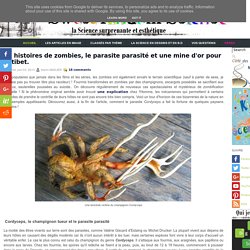
Fourmis transformées en zombies par des champignons, escargots possédés se sacrifiant aux oiseaux, sauterelles poussées au suicide.. On découvre régulièrement de nouveaux cas spectaculaires et mystérieux de zombification naturelle ! Si le phénomène original semble avoir trouvé une explication chez l'Homme, les mécanismes qui permettent à certains parasites de prendre le contrôle de leurs hôtes ne sont pas encore très bien compris. Voici un tour d'horizon de ces bizarreries de la nature en dix exemples appétissants. Theconversation. “I awake in bed … In the corner of the room there are two men.
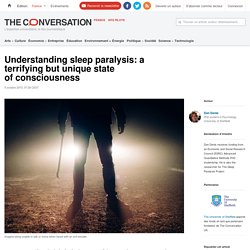
I cannot see them but I know that they are there, and what they look like. I can hear them talking. They are talking about murder. I cannot move. Un parasite qui réduit la peur d’un prédateur par des «manipulations épigénétiques» Les escapades estivales dans la nature nous rappellent souvent, surtout à la tombée de la nuit, qu’il existe toutes sortes de bestioles pour qui notre corps est synonyme de buffet « all you can eat » ! Outre les insectes qui ne nous font que de petites « prises de sang », il y a aussi de nombreux parasites qui, eux, élisent carrément domicile dans notre corps et même pour certains carrément à l’intérieur de nos cellules. Cliquer sur la photo pour agrandir. Le club: zombie, binôme et ancêtres. Les zombies entrent à l’université. Ce n’est plus la menace idéologique du communisme qui effraie l’Occident, ni l’invasion des extraterrestres ou l’hiver nucléaire.
Depuis le début des années 2000, c’est le zombie qui fait frémir l’imaginaire. Avec 155 titres en 20 ans, la Zombie Movie Database répertorie les morts-vivants au grand écran. The Castrating Zombie Parasite. Zombie-town USA. Survivre grâce aux zombies! Et parmi ses sujets d'étude, il en est un qui se démarque du lot : appréhender les comportements des joueurs en situation de crise en plongeant dans ces environnements virtuels. Agence Science-Presse (ASP) — Pourquoi étudiez-vous les comportements des joueurs des jeux en ligne, comme Virtual Zombie ou de DayZ? Matthieu Guitton (MG) — Ce sont d'intéressants terrains d’observation qui me permettent de comprendre comment les gens – ici, les joueurs – réagiront dans un monde hostile où il se produirait des évènements imprévisibles et potentiellement létaux.